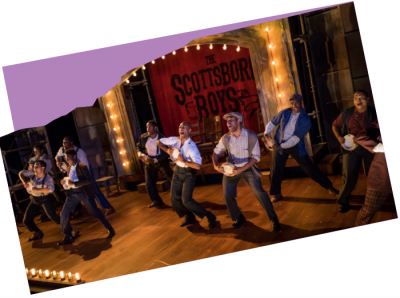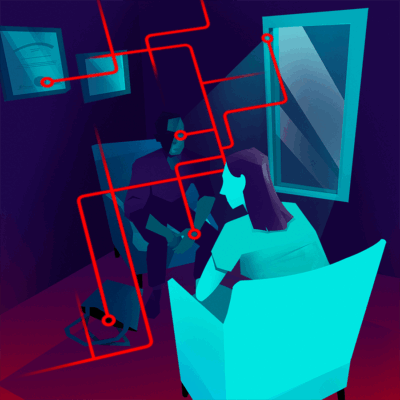Your donation sets the stage for a new season of Boston's most intimate, entertaining and provocative plays and musicals. Our shows make powerful connections with our audiences-- and they are only possible because of you.
Playwright Joshua Harmon
Playwright Joshua Harmon
Joshua Harmon’s first two plays, Bad Jews and Significant Other, were huge hits both Off-Broadway and at SpeakEasy Stage. Both of these shows were so successful in part because of Harmon’s keen ear for satire and gift for thoughtful provocation. So when we first read Admissions, we couldn’t wait to give Boston audiences another chance to laugh, cringe, and cheer along with Harmon’s characters.
Boston Project Playwright MJ Halberstadt recently emailed with Joshua Harmon to discuss his writing process, examining race as a white man, and the Varsity Blues scandal with Lori Laughlin and Felicity Huffman.
MJH: Admissions is a scathing look at the world of both undergraduate admissions and prep school admissions. First off – everyone is dying to know: what did you write your college essay about?
JH: Ha– I wish I remembered. I have a feeling it wasn’t great. I struggle with prose.
MJH: While the play is lowercase-a about college admissions, it feels uppercase-A About whiteness. Did one come first? What was the germ of inspiration?
JH: Although the play is called Admissions and is about an Admissions officer, it’s not really about applying to college. That’s the container, I suppose, to be able to ask the larger questions with which the play is trying to engage.
I don’t believe writing is always a conscious act, so I’d be lying if I pretended to know for sure what had inspired the play, but so much of what I think about in my work, and also in my life, revolves around questions of identity, almost always in terms of religion, ethnicity and sexuality. To be gay in a mostly straight world, to be Jewish in Christian America, means you are constantly aware of your identity, and I have written about those identities a lot. I had not spent as much time considering my racial identity. I suppose when you’re in the majority, you have fewer reasons to confront yourself. I wanted to write a play that forced me to examine what it means to be white, and to look at it from as many angles as possible: white privilege, white power, white anxiety, white guilt, all of it. Conversations on matters of race are happening with greater frequency and intensity all over the nation, which is so necessary, and there are so many ways to have them, and so many different aspects and views to consider and digest. This play is trying to hold up a mirror to privilege and white liberalism, while remaining very conscious of the fact that this is just one narrow slice of a much larger conversation.
I almost always begin with character, and in this case, I started with Sherri Rosen-Mason. I knew a lot of Sherris growing up. I wanted to consider a person who publically said all the right things, and privately wasn’t willing to give up anything. I wanted to understand why so many people claim to want change, and yet change comes slowly, if at all.
I began writing this play long before he-who-shall-not-be-named declared his candidacy for President, but as I reflect on this moment, it feels like we are living in a time of intense hatred. It is everywhere, it is oppressive, it is debilitating. It has been so painful to watch the rise of xenophobia, racism, antisemitism as it creeps out from dark corners and occupies a larger space in the limelight. But it’s also dismaying watching the way the left, and particularly white liberals, disassociate from those people whose views they find reprehensible, as if “they” have nothing to do with “us.” As if we are two completely separate entities. As if we are not all somehow in this thing together.
It is easy to point at someone else as the problem. We see it on the right, and we see it on the left. What we see too rarely is self-reflection. This play, I hope, creates a space for some self-reflection, to look within, to consider the ways in which, even with the best of intentions, we can remain complicit in the perpetuation of something that we simultaneously abhor.
MJH: The absence of people of color from the stage feels very deliberate, given the subject matter. Can you say more about that choice?
JH: I spent so much time grappling with this question. On some level, there was never going to be a “right” answer. I believe that people reveal their truest selves when they are in their most private spaces. People behave differently in “polite company” than when they are alone. So I felt, if I were going to successfully drill down into the bedrock of the lives of well meaning white liberals, and have any chance at exposing something honest and true and real about how privilege operates, I had to put them onstage alone, to observe them in their natural habitats, to see what they say and do and think and feel when the doors are closed, the windows shut, and they are all by themselves alone. Only in their private spaces, when they think no one is watching, would they reveal their truest selves.
Knowing that was the world I was trying to capture, after much thoughtful consideration, I felt that there would actually be something morally reprehensible about asking an actor of color to stand up in the middle of that and speak the point of view of a person of color– as written for them by a white person. That’s just not my story to tell. The most authentic thing I could do, the thing I was best equipped to offer an audience, was an honest examination of myself, the people around me, the world I know, and to hold up the mirror to reflect back what I saw.
Ultimately, I took my inspiration from this genius quote from the late, great Toni Morrison: “The people who do this thing– who practice racism– are bereft. There is something distorted about the psyche… If you can only be tall because somebody’s on their knees, then you have a serious problem. And my feeling is, white people have a very, very serious problem. And they should start thinking about what they can do about it. Take me out of it.” That was, in many respects, my guiding principle.
MJH: Speaking of offstage characters, some great scenes revolve around the onstage characters’ conflicting perceptions of characters we don’t meet, especially Perry, Olive, and Marshall. Do you have a clear sense of who they are?
JH: As a general rule, I love offstage characters. I encourage my students to write them into their plays. I find that, with a few smart brushstrokes, you can expand the world of the play. At one point, I got stuck, so I wrote monologues for the offstage characters, to learn more about them. I wound up writing this scathing monologue for Marshall about how much he hated Hillcrest, how furious he was when Bill came to ask him for money. By diving into his psyche a little, I discovered something, which made its way into the next draft through Ginnie and Sherri.
MJH: Before Admissions, SpeakEasy was privileged to produced Bad Jews and Significant Other. Both plays take the time to tackle an idea – modern Judaism, the gay best friend trope — from several angles. Is that what makes a Josh Harmon play a Josh Harmon play? Or something else?
JH: I think writers are sometimes the worst judge of their own work. But I will say that I get excited about writing a play when I am consumed by a question with no easy answers. If I know exactly how I feel about something, there’s nothing more to say. But if something is genuinely confounding, it can be a great privilege to pick it up and look at it from as many angles as possible, to try and step into points of view I don’t necessarily share, but to consider what it might be like to think differently, take that point of view to its logical conclusion, and then to consider a counterargument which cuts that first point of view down to size, and then counter that again. What you discover when you ask difficult questions is that you’re led to more questions, rather than answers. I find that kind of intellectual exercise incredibly exciting. That said, questions in and of themselves are merely thought experiments; I only write a play if a character captures my imagination, and I sense I can marry the political or cultural question to a very personal story.
MJH: How does Admissions fit that description?
JH: It’s a character-driven play about people in complicated moments in their lives, asking unanswerable questions. And also, I was scared to write it. In my actual life, I try to avoid feeling scared, but in my writing, I have this masochistic impulse to run toward the things that scare me. Joni Mitchell said, after making the album Blue, she felt like a cellophane wrapper on a pack of cigarettes: see-through, vulnerable, exposed. That has been my guiding artistic principle. I believe it should cost a writer something to write a play, that one has an obligation to scrape out one’s insides, shape it into something resembling art and then allow everyone to look at it. It’s as painful as it sounds. And it never gets easier. But it’s the only way I know to make something worthwhile.
MJH: No doubt you’re aware of recent major news stories about affirmative action at Harvard and the corrupt college admission ring led by Rick Singer – both stories that unfolded after the play premiered. What do you think accounts for the potency of stories about college admission in our current political moment?
JH: These questions don’t actually feel unique to our moment. They seem to come up all the time. I just think when you’re talking about education, you simultaneously tap into political questions that lie at the heart of the founding of our nation, and questions about what people want for their own children. People don’t tend to behave rationally when it comes to their kids. So it’s a perfect storm, where the political meets the personal. That said, the Varsity Blues scandal, while not surprising (rich people game the system? Duh) feels like the tip of the iceberg in terms of the kind of corruption and abuse of power that goes on every day. It is profoundly nauseating to think of all the ways the most advantaged among us continue to bend and break the rules when it suits their needs. Then again, ethical behavior isn’t exactly having a moment in our country, is it?
MJH: What can we look forward to next from your desk?
JH: I’m co-writing the book of a musical with Sarah Silverman, based on her memoir, The Bedwetter. It goes up at the Atlantic Theatre this spring. Come see us in New York!
 Past Productions
Past Productions Primary Trust
Primary Trust Lizard Boy: A NEW MUSICAL
Lizard Boy: A NEW MUSICAL JOB
JOB The Antiquities
The Antiquities Swept Away
Swept Away




